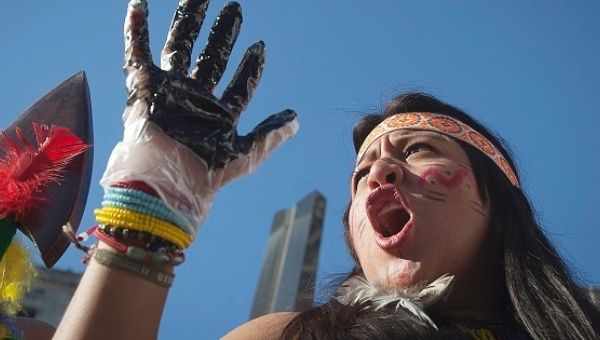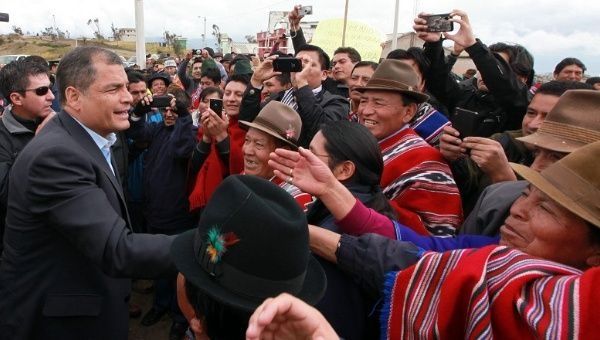While making history with landmark social and economic gains in the past decade under the government of President Rafael Correa, Ecuador has also made historic advances by incorporating environmental rights and Indigenous world views into its constitution.
But the South American country is also the site of a heated debate around the question of extractivism and the role of oil and mining in funding revolutionary social and economic change — an issue that even divides its Indigenous communities.
In 10 years, Correa and what has been dubbed the “Citizen’s Revolution,” led by the ruling Alianza Pais party, has cut extreme poverty nearly in half, vastly expanded health and education funding and made strides in improving Indigenous participation in politics and public institutions.
While many Indigenous groups praise this progress, others see the continued reliance on resource extraction — which has shifted to be a model of state control and is used to fund social programs under Correa’s anti-imperialist vision of “21st Century Socialism” — as an irreconcilable sticking point.
“We are firmly against the mining policy, against the extractivist policy, because behind all this is the large concentration of land for transnational corporations,” Jorge Herrera, leader of the Confederation of Indigenous Nationalities of Ecuador, known as Conaie, told teleSUR.
The rift in Indigenous movements reflects a broader debate around the challenges of so-called progressive extractivism. The policy, championed by countries like Ecuador and Bolivia, argues that when faced with a choice between ending extractivism and ending poverty and hunger, the moral route is to reduce people's suffering with initiatives funded by state-regulated extraction while using the most responsible and environmentally prudent approaches, pending further diversification away from fossil fuel dependence.
For Carlos Viteri Gualinga, leader of the Sarayaku community from the Shuar nationality in the Amazon, this is the underlying issues that informs his support for the government and the Citizen’s Revolution.
“There are sectors that argue that Ecuador should stop extractivism. I share that idea, I don’t like mining, I don’t like oil,” he told teleSUR. “But I like even less that our children still have nutrition problems, I like even less that our elders still don’t have the right protection from the state, I like even less that in the territories of my communities and nationalities there is still a lack of basic services."

An Ecuadorean demonstrator holds up an oil soaked hand at a protest against U.S. corporation Chevron for contaminating the Amazon. | Photo: Reuters
Despite making up only about 7 percent of the country’s 16 million people, Ecuador’s Indigenous population has historically been a powerful political force. More than a million people in Ecuador are Indigenous. The small nation roughly the size of the U.S. state of Nevada is home to 14 Indigenous nationalities and 18 communities spread across its coastal, highland and Amazon jungle regions, according to Herrera.
With such a diverse population, and after years of discrimination, Ecuador under President Correa has made strides in the past decade toward greater inclusion and equality. The country has established itself as a plurinational state in its constitution, Quechua and Shuar have both been recognized as official languages, and Indigenous legislators make up 11 percent of the National Assembly.
RELATED:
Ecuador Indigenous Leaders Win Right to Fight Chevron For $12B
Viteri, a longtime activist and current member of the National Assembly — where he proudly wears his traditional headdress of bright yellow and red feathers as a symbol of his people and culture from the Pastaza province — argued that under the Correa government, local groups have acquired access to sustainable wealth, regained their rights, and reclaimed their place as active participants in the construction of Ecuadorean society.
“Ecuador will never go back to being the country it was 10 years ago,” said Viteri. “A country in bankruptcy, a country sunk in the deepest political, economic, and social crisis and a country virtually without self-esteem.”
Conaie, on the other hand, has called for a national debate on mining and oil extraction, and the movement against such industries — and the combative relationship with the state that comes with it — are far from new.
“Land, water, technology, credit, commercialization systems are vital topics as state policy, which have been among the things being demanded of this government and all the governments that have passed,” said Herrera, wearing a red poncho and black hat, representing the Wintza community of the highland province of Cotopaxi. As ways forward he proposed, among other measures, lower interests for private banks to boost investment in agricultural development and for the nationalization of cell phone service as a new revenue source.
Despite a history as a powerful political actor with a strong capacity to mobilize that even helped bring down presidents with street protests as recently as the early 2000s, Conaie has seen divisions in recent years between its leaders and the grassroots of the organization.
Conaie organized several protests against the government in the past year, but none reached the scale seen in the 1990s and early 2000s before Correa was elected. In the upcoming elections, Conaie supports presidential candidate Paco Moncayo, a former military man who has gathered the support of local organizations that don't back the current government or Correa's successor, former Vice President Lenin Moreno.
Ten years ago, Conaie — together with its electoral affiliate Pachakutik — was actually part of the broad-based progressive movement that helped bring the Correa government to power in 2006. But growing rifts led to a breakdown in the relationship in the first years of the administration and Conaie shifted alliances largely to the right-wing opposition.
RELATED:
Ecuador Lived a Decade of Social and Economic Progress: Report
“It’s one thing being political and another is politicking, and there’s a historic process of a political and organized struggle and an electoral political struggle,” said Herrera, adding that more than winning the presidency, his movement wants to secure seats in the National Assembly.
But Viteri is skeptical of Conaie leaders’ position, saying they align with old political parties that destabilized the country and former bankers who were responsible for a grave economic crisis that spurred massive emigration and devastating economic losses at the end of the 1990s.
“In its opposition, it becomes involved with the rest of the opposition political parties and groups, like the right wing who did so much harm to the country,” said Viteri.
“We have obtained our constitutional rights,” he continued, adding that “staying out” of the Citizens' Revolution process and siding with the political opposition is a form of “turning their backs against the gains that our fight achieved.”
For Viteri, the achievements of that fight and the profound transformations in the country over the past decade also mean there is a lot at stake in the Feb. 19 election.
Herrera acknowledges, on the other hand, that Indigenous communities have been protected under the new constitution, while also arguing that there needs to be a new government willing to resolve their problems, including natural resource extraction and their cosmovision.
But many question the logic behind creating the conditions for the right wing to possibly return, a political bloc historically hostile to Indigenous rights, let alone protecting the environment or redistributing wealth to fund social programs and alleviate poverty.
“No matter which government reaches the presidency of Ecuador, we will continue to fight, searching for a deep transformation,” he said.
RELATED:
Ecuador Indigenous Group Releases Soldiers Abducted in Conflict
However, in many ways, deep transformation has already taken place. The constitution was rewritten in 2008 through a popular constituent assembly, enshrining the rights of Mother Nature, known as Pachamama.
The chapter on Rights for Nature states, “Nature or Pachamama, where life is reproduced and exists, has the right to exist, persist, maintain and regenerate its vital cycles, structure, functions and its processes in evolution.” It also adds, “The persons, people, communities and nationalities will have the right to benefit from the environment and from natural wealth that will allow wellbeing.”
“Our constitution is the only one, besides the Bolivian process, that recognizes nature’s rights, and also recognizes the rights of communities and ancestral nationalities,” said Viteri who, as a legislator, has worked on developing an Environmental Organic Code aimed at gathering environmental legislation into a single body. “In its constitution since 2008, Ecuador recognizes the state as a plurinational state.”

President Correa is greeted by the largely Indigenous population in Cacha, Chimborazo province, July 30, 2015. | Photo: Ecuador Presidency
With constitutional rights of nature as a foundation, the struggle for protection of the environment, a balance between humans and nature and real holistic development have become key aspects of the Indigenous struggle in the country — a fault line along which divisions have also formed.
Viteri says this has led to political parties trying to win the support of the communities to advance their own agendas, namely opposing Correa’s government, which has sparked a tense political scenario between the government and some groups.
Ecuador has also championed the paradigm of “Sumak Kawsay” — “buen vivir” in Spanish — the ancient Indigenous concept that roughly translates to “good living” or “living well,” but goes beyond Western ideas of development by embracing an understanding of “wellbeing” that is inseparable both from community and harmonious coexistence with nature. The term is mentioned 18 times in the constitution, which aims to “build a new form of civic coexistence, in diversity and harmony with nature” by “celebrating nature, the Pachamama, of which we are a part and which is vital for our existence.”
RELATED:
Nearly 2 Million Ecuadoreans Lifted out of Poverty since 2009
Viteri believes that with strict environmental regulations and community consultation, responsible resources extraction is possible. He argues these communities should be the first beneficiaries of the resources and be able to live in harmony and respect between humans from different cultures and nature. In this process, he said, Sumak Kawsay is a guiding principle on “an alternative path to the failed development model invented by the Western world.”
But others, including Conaie’s leadership, aren’t willing to compromise on the ecological aspects of the concept or the constitutional rights of nature by continuing extraction, even if it is designed to fuel social and economic development.
“The ‘earned decade’ he has called it, but for us in many of the cases it has been a regression,” said Herrera.
As Sunday’s election approaches, the country prepares to decide whether to continue down the progressive road of the Citizens’ Revolution with Lenin Moreno in the driver’s seat, or to make a U-turn as the likely alternative will be right-wing banker Guillermo Lasso.
If the latter happens, then Herrera and other Indigenous opposition members like him may actually get to see what true “regression” looks like when it comes to their rights and wellbeing, and any rights for nature.